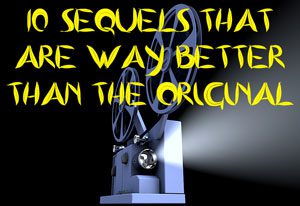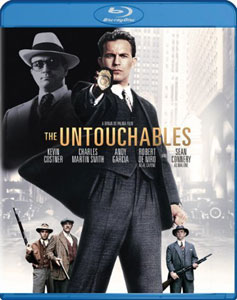I wouldn’t mind looking at a series of still photos from “The Untouchables” (1987) or listening to the genre-hopping score by Ennio Morricone. But when watching the film, I kept expecting character depth or layers of insight into alcohol Prohibition and the government-versus-mob battles, and these things never emerge.
There are occasional lines with a David Mamet flavor (“Yes, surprise is half the battle. A lot of things are half the battle. Losing is half the battle”), but his screenplay doesn’t take the reins of “The Untouchables,” and the film doesn’t rise above something that looks gorgeous and sounds pretty.
A total mismatch
Kevin Costner’s federal Treasury agent Eliot Ness, a mix between a milquetoast and Tommy Lee Jones’ morally detached character in “The Fugitive,” clearly can’t stand toe-to-toe with Robert De Niro’s Al Capone and his paid-off allies in Chicago, but the film asks us to believe he does.

“The Untouchables” (1987)
Director: Brian De Palma
Writers: David Mamet, Oscar Fraley, Eliot Ness
Stars: Kevin Costner, Sean Connery, Robert De Niro
Ness’ key ally is local cop Malone (Sean Connery, with too much gravitas for this part); another is FBI accountant Oscar (Charles Martin Smith), who figures out they can make a case against Capone for income-tax evasion, since he doesn’t cook books as well as he hides bodies. Granted, Mamet is drawing upon historical figures, so perhaps it’s a case where truth is stranger than fiction, and maybe a pass should be given to these character sketches.
There’s obviously meaty stuff to dig into about the legal absurdities, unintended consequences and strange bedfellows of Prohibition, but it all sits on the surface of director Brain De Palma’s film. Capone being convicted of income-tax evasion (the government arguing that it is owed a cut of Capone’s illegal enterprises, and the court agreeing) is a famous and bizarre case. But even that quirk has no zest in this film.
While Capone serves his purpose as a scenery-chewing baddie – at one point murdering one of his henchmen with a baseball bat – we don’t get any insight into the point of view of the functional good guys. Are they aware that the black market Capone thrives under is a creation of Prohibition, and they are therefore working for the agency that created this situation? They don’t appear to be, so much so that I wonder if Mamet and De Palma are even interested in the question.
Certainly, some irony is evoked – Ness says that he’s going to get a drink to celebrate once Prohibition is repealed – but I have no idea if Ness learned anything from these events. “The Untouchables” is far from the only film that gives a viewer no one to root for, but I’m not sure if the filmmakers intend for Ness and his crew to be heroes or villains. At any rate, they land flat by either reading.

Nice production design
The production design by William A. Elliott can’t be argued with; I see it was nominated for an Oscar, and that’s legitimate. If I was told “The Untouchables” (based on the 1959-63 TV series) was shot in 1930 – in addition to being set in that year – I would’ve believed it.
De Palma also uses a leisurely paced Old Hollywood style to evoke the time period, although one dramatic scene – the baby stroller falling down the stairs — is so clunky it’s frustrating to watch. But at least I now know what “Naked Gun 33 1/3: The Final Insult” is making fun of. For the most part, though, “The Untouchables” is film-class good, and a person could get a worse film-class assignment.
“The Untouchables” gives a viewer a general sense of how the Prohibition conflicts functioned, like modern drug-war actioners but with tommy guns and Bentleys. While the shoot-’em-ups are old-fashioned, they do have their moments, including Malone chastising his enemy for bringing a knife to a gunfight. But the shallowness of such a revered film galls me.
The underplaying of Mamet’s dialog is mildly irksome, but what’s worse is that Mamet himself leaves Ness, Capone and everyone around them as one-dimensional characters despite having the freedom to play around with and/or dig into the details of history.

